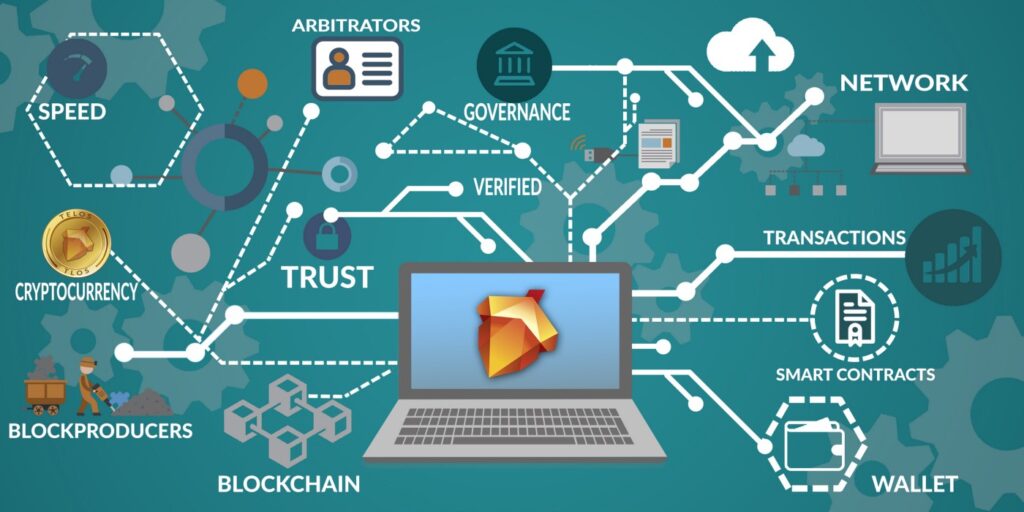Features of Blockchain Technology In 2023: Blockchain technology has been presented as a disruptive technology that offers, mainly, security levels never seen before, necessary, and desired not only by the IT or finance industry but, in general, for any type of Industry, which makes it an incredibly versatile technology.
In this article, we learn about the different applications of Blockchain Technology. While the idea works extremely well for Bitcoin and other cryptocurrencies, there are loads of other useful applications of blockchain technology.

Features of Blockchain Technology In 2023 are
1. Money transfers
The original concept behind the invention of blockchain technology is still a great application. Money transfers using blockchain can be less expensive and faster than using existing money transfer services. This is especially true of cross-border transactions, which are often slow and expensive. Even in the modern U.S. financial system, money transfers between accounts can take days, while a blockchain transaction takes minutes.
2. Financial exchanges
Many companies have popped up over the past few years offering decentralized cryptocurrency exchanges. Using blockchain for exchanges allows for faster and less expensive transactions. Moreover, a decentralized exchange doesn’t require investors to deposit their assets with the centralized authority, which means they maintain greater control and security. While blockchain-based exchanges primarily deal in cryptocurrency, the concept could be applied to more traditional investments as well.

3. Lending
Lenders can use blockchain to execute collateralized loans through smart contracts. Smart contracts built on the blockchain allow certain events to automatically trigger things like a service payment, a margin call, full repayment of the loan, and release of collateral. As a result, loan processing is faster and less expensive, and lenders can offer better rates.
4. Insurance
Using smart contracts on a blockchain can provide greater transparency for customers and insurance providers. Recording all claims on a blockchain would keep customers from making duplicate claims for the same event. Furthermore, using smart contracts can speed up the process for claimants to receive payments.

5. Real estate
Real estate transactions require a ton of paperwork to verify financial information and ownership and then transfer deeds and titles to new owners. Using blockchain technology to record real estate transactions can provide a more secure and accessible means of verifying and transferring ownership. That can speed up transactions, reduce paperwork, and save money.
6. Secure personal information
Keeping data such as your Social Security number, date of birth, and other identifying information on a public ledger (e.g., a blockchain) may actually be more secure than current systems more susceptible to hacks. Blockchain technology can be used to secure access to identifying information while improving access for those who need it in industries such as travel, healthcare, finance, and education.

7. Voting
If personally identifiable information is held on a blockchain, that puts us just one step away from also being able to vote using blockchain technology. Using blockchain technology can make sure that nobody votes twice, only eligible voters are able to vote, and votes cannot be tampered with. What’s more, it can increase access to voting by making it as simple as pressing a few buttons on your smartphone. At the same time, the cost of running an election would substantially decrease.
8. Government benefits
Another way to use digital identities stored on a blockchain is for the administration of government benefits such as welfare programs, Social Security, and Medicare. Using blockchain technology could reduce fraud and the costs of operations. Meanwhile, beneficiaries can receive funds more quickly through digital disbursement on the blockchain.

Keeping medical records on a blockchain can allow doctors and medical professionals to obtain accurate and up-to-date information on their patients. That can ensure that patients seeing multiple doctors get the best care possible. It can also speed up the system for pulling medical records, allowing for more timely treatment in some cases. And, if insurance information is held in the database, doctors can easily verify whether a patient is insured and their treatment is covered.
10. Artist royalties
Using blockchain technology to track music and film files distributed over the internet can make sure that artists are paid for their work. Since blockchain technology was invented to ensure the same file doesn’t exist in more than one place, it can be used to help reduce piracy. What’s more, using a blockchain to track playbacks on streaming services and a smart contract to distribute payments can provide greater transparency and the assurance that artists receive the money they’re owed.

11. Non-fungible tokens
Non-fungible tokens, or NFTs, are commonly thought of as ways to own the rights to digital art. Since the blockchain prevents data from existing in two places, putting an NFT on the blockchain guarantees that only a single copy of a piece of digital art exists. That can make it like investing in physical art but without the drawbacks of storage and maintenance.
NFTs can have varied applications, and ultimately they’re a way to convey ownership of anything that can be represented by data. That could be the deed to a house, the broadcast rights to a video, or an event ticket. Anything remotely unique could be an NFT.
12. Logistics and supply chain tracking
Using blockchain technology to track items as they move through a logistics or supply chain network can provide several advantages. First of all, it provides greater ease of communication between partners since data is available on a secure public ledger. Second, it provides greater security and data integrity since the data on the blockchain can’t be altered. That means logistics and supply chain partners can work together more easily with greater trust that the data they’re provided is accurate and up to date.
13. Secure Internet of Things networks
The Internet of Things (IoT) is making our lives easier, but it’s also opening the door for nefarious actors to access our data or take control of important systems. Blockchain technology can provide greater security by storing passwords and other data on a decentralized network instead of a centralized server. Additionally, it offers protection against data tampering since a blockchain is practically immutable.

14. Data storage
Adding blockchain technology to a data storage solution can provide greater security and integrity. Since data can be stored in a decentralized manner, it will be more difficult to hack into and wipe out all the data on the network, whereas a centralized data storage provider may only have a few points of redundancy. It also means greater access to data since access isn’t necessarily reliant on the operations of a single company. In some cases, using blockchain for data storage may also be less expensive.
15. Gambling
The gambling industry can use blockchain to provide several benefits to players. One of the biggest benefits of operating a casino on the blockchain is the transparency it provides to potential gamblers. Since every transaction is recorded on the blockchain, bettors can see that the games are fair and the casino pays out. Furthermore, by using blockchain, there’s no need to provide personal information, including a bank account, which may be a hurdle for some would-be gamblers. It also provides a workaround for regulatory restrictions since players can gamble anonymously and the decentralized network isn’t susceptible to the government shutdown.

Blockchain Technology Use Cases in 2023
Features of Blockchain Technology In 2023: Here are the hottest Blockchain technology use cases categorized under specific industries/applications:
1. Smart Contracts
Smart contracts Blockchain-based contracts are enforced in real time. They are created as an agreement between two or more parties without the involvement of any intermediary. The contract exists across a distributed and decentralized Blockchain network. Smart contracts are now a staple in healthcare, real estate, and even for government agencies.
2. Internet of Things (IoT)
The Internet of Things (IoT) industry is growing rapidly with billions of connected devices. The latest forecasts suggest that by 2030, there will be 50 billion devices in use globally. As this number continues to grow, it will increase vulnerabilities as hackers can easily breach your data through a single connected device. By integrating Blockchain technology into IoT devices, the possibility of data breaches can be reduced to a great extent.

3. Money Transfer
Money transfer and payment processing are the most excellent Blockchain technology use cases. Blockchain tech enables lightning-fast transactions in real time. This has already transformed the BFSI sector for good as it saves both time and money.
4. Personal Identity Security
Personal identity theft and hacking are hot crimes in the cybercrime domain. In 2019, nearly 14.4 million people fell victim to identity fraud, which roughly translates to about 1 in 15 people. From hacking and violating personal files to forging documents, identity theft comes in many different forms. Blockchain can help combat this menace by storing crucial personal information on a decentralized and immutable ledger.
5. Logistics
Blockchain technology is extensively used in the logistics industry for effectively tracking goods’ movement over multiple locations. The data’s transparent recording regarding the goods’ movement on the blockchain will help all stakeholders understand the precise location of goods. So, logistics is one of the blockchain technology use cases that guarantee effective management of all entities used in the transaction.

6. Digital Media
Digital media companies are burdened with many challenges like data privacy, piracy of intellectual property, royalty payments, and copyright infringement, among other issues. By incorporating Blockchain technology into the digital media infrastructure, companies can protect their intellectual property, maintain data integrity, target the right customers, and ensure that artists receive their royalty payments in due time.
7. Education
Blockchain technology can be seamlessly integrated into control systems and document storage. The key benefit of this blockchain use case is the incapability to modify data saved in the system. The information can be added but can’t be overwritten. Moreover, the document’s legality can be easily confirmed because everybody can observe who wrote it and when.
8. Medical Field
The use of blockchain technology in the healthcare industry proves to be a lifesaver, especially in terms of data processing. The reason is the medical business has long been exploited. Based on blockchain technology, works as a tool to control and account for the data concerning modifications in medical records. It means that the answer was for data to be saved outside the blocks, whereas the links directing to huge files will be saved on the blockchain.

9. Entertainment
One of the most interesting and prevailing blockchain use cases is entertainment. Blockchain technology prevents gambling sanctions in several jurisdictions due to cryptocurrency’s non-recognition as property or cash. It is a blockchain-centered payment and distribution platform for audiovisual products. It helps you publish material, handle contracts, and make payments from a single place.
10. Real Estate
The real estate market faces many issues, specifically connecting buyers and sellers. Currently, buyers need to meet the seller or brokers to finalize a deal. The duration can range from a few months to a year. Furthermore, the paperwork can be a tedious task. It demands a lot of effort to complete the paperwork, which can still be impacted by incorrect data input.
Check Also: What And How Blockchain Is Detailed?
Frequently Asked Questions (FAQs)
What is interesting about blockchain?
Blockchain helps in the verification and traceability of multistep transactions needing verification and traceability.
What technology is used in blockchain?
Blockchain technology uses hashing and encryption to secure the data, relying mainly on the SHA256 algorithm to secure the information.
What is the real purpose of blockchain?
The goal of blockchain is to allow digital information to be recorded and distributed, but not edited.
How is blockchain used in everyday life?
Top Blockchain Applications To Know
Money transfer, Smart contracts, the Internet of Things, Personal identity security, Healthcare, Logistics, Non-fungible tokens (NFTs), and Government.
Who invented blockchain?
It was created by the unknown persons behind the online cash currency bitcoin, under the pseudonym of Satoshi Nakamoto.
What is the best example of blockchain?
Bitcoin and Ethereum are popular examples of blockchains. Everyone is allowed to connect to the blockchain and transact on them.
Why is it called blockchain?
As described in Blockchain for Dummies, “Blockchain owes its name to the way it stores transaction data—in blocks linked together to form a chain.
What is blockchain in one word?
Blockchain is a shared, immutable ledger that facilitates the process of recording transactions and tracking assets in a business network.
What is another name for blockchain?
Blockchain, sometimes referred to as distributed ledger technology (DLT), makes the history of any digital asset unalterable and transparent through the use of a decentralized network and cryptographic hashing.
How many blockchains exist?
There are four main types of blockchain networks: public blockchains, private blockchains, consortium blockchains, and hybrid blockchains. Each one of these platforms has its benefits, drawbacks, and ideal uses.
What is the most powerful blockchain?
The total number of transactions on Ethereum surpassed the number of Bitcoin transactions for the first time.
Which country is best for blockchain?
Switzerland is a popular crypto hub, especially in Zug, with Lugano emerging as another crypto-friendly city that plans to pay its taxes in digital currency.





